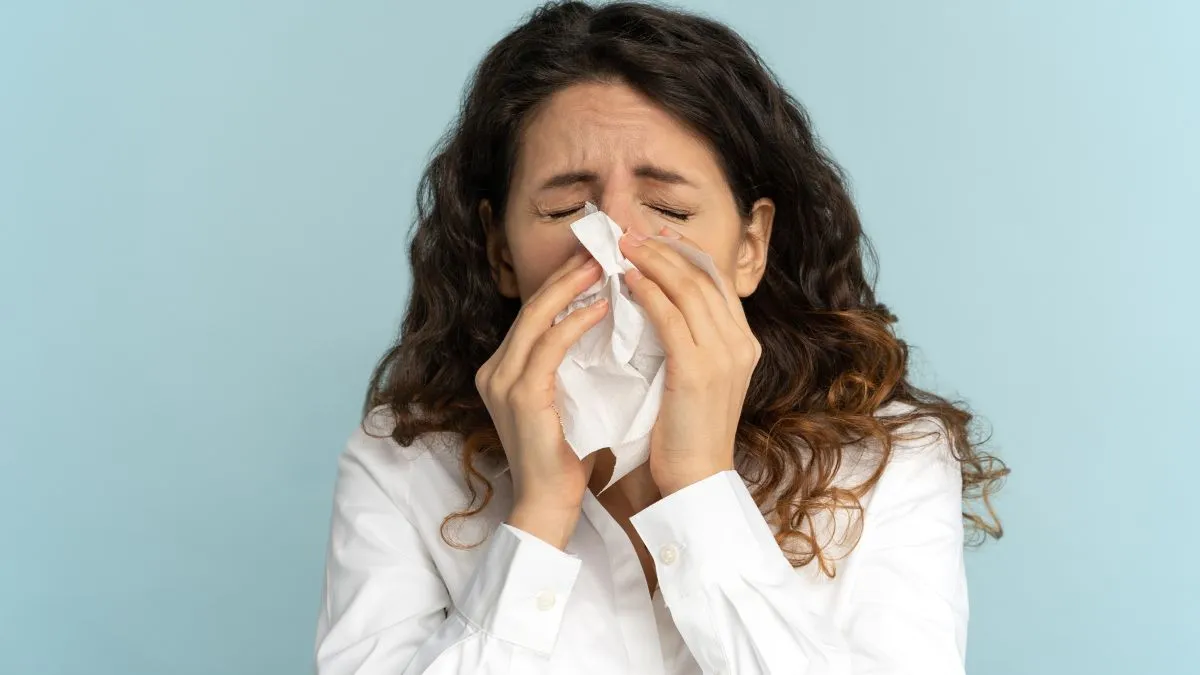- By Bornika Das
- Mon, 13 Oct 2025 06:04 PM (IST)
- Source:JND
As winter comes along, most people find their allergy symptoms worsening, and they find themselves sneezing, coughing, or having dry, scratchy eyes. Allergies do not only happen in spring, contrary to popular perception; winter may even exacerbate them. In winter, human beings become more homebound with windows shut, where pet dander, mold spores, and dust mites thrive in ideal conditions. The absence of clean air circulation holds these allergens within, causing reactions even in individuals who do not normally react during other times.
This winter allergy can usually be caused by indoor environmental conditions instead of outdoor pollen. Central heating, low humidity, and inadequate ventilation have a chance to irritate the nasal passages and make the immune system more sensitive. Moreover, contact with strong perfumes, wood smoke and home cleaning chemicals may exacerbate symptoms. Being aware of these causes and implementing prevention measures, such as employing air purifiers, keeping the living area clean, and maintaining balanced humidity, can be very effective in minimising discomfort and preventing winter allergy episodes. In conversation with The Daily Jagran, Dr Sujatha Ramesh, Consultant- Paediatric Allergy & Immunology, Manipal Hospital Yeshwanthpur, shares the common triggers of winter allergies and how to stay safe.
Why Allergies Get Worse In Winter?
Allergies often intensify during winter due to several factors. Viral respiratory infections peak during this season and tend to aggravate allergic symptoms. Dr Sujatha Ramesh shares, “As temperatures drop, people spend more time indoors, increasing exposure to indoor allergens, especially House Dust Mites (HDM).” These microscopic organisms live in mattresses, sofas, quilts, and carpets, feeding on dry flakes of human skin (dander).
ALSO READ: Doctor Explains Signs You Might Have A Dust Allergy And How To Fix It
HDM is the most common allergen responsible for respiratory allergies such as asthma and allergic rhinitis. Dr Sujatha Ramesh states, “If you experience a persistent cough, shortness of breath, or wheezing, it could indicate asthma, which is often associated with allergic rhinitis.” Typical signs of allergic rhinitis include constant colds, a runny or stuffy nose, an itchy nose, or frequent sneezing. Viral infections in winter can worsen all these symptoms.

Allergy In Winter Preventive Measures (Image Credits: Canva)
How To Stay Safe And Reduce Exposure?
To keep indoor allergens at bay, wash bed linen, including bed sheets, pillow covers, and blankets, weekly in hot water. Use allergy-proof encasings for mattresses and pillows or place them under direct sunlight regularly. Dr Sujatha Ramesh states, “Avoid quilts, comforters, and woollen blankets since they are difficult to wash, and remove carpets where possible.” Replace cloth upholstery with rexine or faux leather, which can be wiped clean with a damp cloth. Declutter your home by removing old books, decorative items, and soft toys that trap dust.
An annual influenza vaccination is strongly recommended to prevent viral respiratory infections that can aggravate allergies.
When To See A Specialist?
Consulting an allergy specialist is crucial. They can prescribe preventive medication and conduct tests to identify specific allergens. Specialists can also initiate allergen immunotherapy, which helps build natural immunity against allergens. Dr Sujatha Ramesh says, “Earlier, this therapy involved injections or drops requiring frequent hospital visits.” Today, dust mite immunotherapy is available as a simple tablet proven to effectively control symptoms, strengthen natural barriers, and induce long-term tolerance to allergens, reducing the chances of allergic diseases in the future.
ALSO READ: What Are The Top Natural Remedies That Effectively Treat Monsoon Allergies?
Winter allergies can be managed effectively with simple lifestyle measures, timely vaccination, and expert medical intervention. Recognising triggers and taking preventive action early helps you breathe easier and stay healthier throughout the season.

